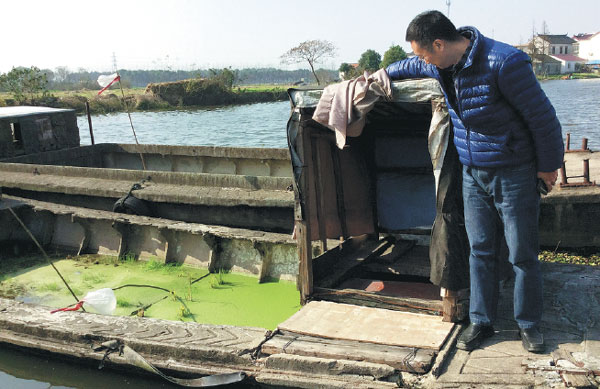Waste not, want not
Updated: 2016-01-06 08:20
By Yang Wanli(China Daily)
|
|||||||||||
|
Vacuum toilet system designer Fan Bin aboard a "night soil boat" in Chentang village, Changshu, Jiangsu province, on Dec 3. The boat carries the waste from several riverside villages to farmland where it is used as fertilizer. Photos by Yang Wanli / China Daily |
Experts say improving the poor sanitary facilities in the country's rural areas through the use of eco-friendly toilets will raise residents' standards of living and protect the environment, as Yang Wanli reports from Changshu, Jiangsu province.
Compared with many of his middle-aged peers, who are conventional and wary of new developments, Wang Yuanyuan is an exception. In the early 1990s, the 67-year-old farmer was the first to install a flushing toilet in his home in Chentang, a village in Changshu city, Jiangsu province. Decades later, Wang again was at the forefront of another ecologically friendly sanitary revolution when he purchased a vacuum toilet.
In January 2011, with the help of an expert team from Beijing, Wang's family became the first in Chentang to experience the "high-tech" toilet, which is made of white porcelain and looks no different from the regular thing.
"But it only uses 5 percent of the water required by a normal flush toilet," Wang said. In his 3-square-meter bathroom, the old and new toilets stand face to face. At first glance, apart from the wooden seat on the old toilet, the two are almost indistinguishable, but the new toilet has a completely different sewage system than its predecessor.
In China's urban areas, flush toilets are connected to underground sewers, but in the rural areas, there is no such network. Even with the same type of flushing toilet, the sanitation system in Wang's house operated differently than those in modern apartments in cities because all the waste was simply carried into a large hole next to the house. In 1994, when it was installed, the system - a flush toilet, a cement hole and several connecting pipes - cost 2,000 yuan ($312), equal to about half of China's per capita GDP that year.
The decision meant that Wang's family no longer needed to use the public toilets like the other residents, but it also had a downside; he had to empty the cement hole - the storage pit - once or twice a week. Moreover, because it was just outside the window of the main living room, had to make sure he covered it carefully. "Otherwise, the awful smell would be really disgusting, especially during summer," he said.
Today's Top News
Concerns grow over Saudi-Iranian rising tensions
Obama tightens gun rules, requires background check
Refugee boy becomes first casualty in 2016
China's high-tech exports beat Japan and South Korea
Storm Frank batters northern Britain
Over 1 million refugees fled to Europe by sea in 2015
Germany to spend 17b euros on refugees in 2016
Demand booms for high-end financial talent
Hot Topics
Lunar probe , China growth forecasts, Emission rules get tougher, China seen through 'colored lens', International board,
Editor's Picks

|

|

|

|

|

|







